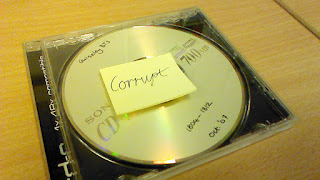 | |
| Some of the floppy disks we have been looking at |
The first stage of this work has been to search our accessions database and catalogues for any mention of digital media. James has had the rather tedious job of running keyword searches over our finding aids in order to create a list of the archives that contain digital media. This list is pretty much complete now and next week we will start to pull material out of the strongrooms and see what we actually have.
However, in preparation for working with the real archives, we have also been doing a bit of a warm-up exercise on some old digital media found tucked away in people's offices. As well as being a means to hone our skills in this area, and test tools and workflows, this is also a very useful exercise in its own right. As a long-established organisation that has existed over a period of many technological changes, it is not surprising that we have a variety of different digital storage solutions for our administrative files. We are currently establishing a more cohesive strategy for storing all of our own digital material and part of this process is to ensure that any digital files that are important to us are stored in a logical location on a server and regularly backed up.
In the past floppy disks were regularly used to back up files and transfer files between computers. Some of these floppy disks still exist (and most are still readable) so James is currently working through them, virus checking them, running DROID to find out the file formats and opening the files to look at the content. He is creating a list from which we can highlight anything that is important and unique and in need of rescue. Many will be back-ups or earlier versions of things we already have on our shared filestore. Many of the unique files will be of limited value. However, we are expecting there will be other files that will be more interesting, and will be useful in showing the history and development of our organisation.
In terms of file formats, James is finding a lot of Microsoft Word 97-2003, WordPerfect 6.0 and PDF 1.4 files. No major problems with being able to read these at the moment so that is encouraging. A couple of old databases have emerged in Paradox and an early version of Microsoft Access which we are struggling to open. We expect to find earlier data going back to the 1990's as James works through the stratigraphy of the pile of disks on his desk. What better job for a recent archaeology graduate!
After the floppy disks have been tackled we may decide to move on to the CDs in the office. Far more numerous but it could be argued they are equally vulnerable.
Jenny Mitcham, Digital Archivist
